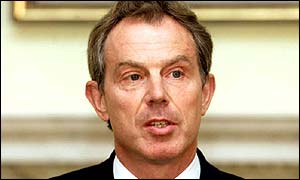| You are in: UK Politics | ||||||||||||||||||||||||||||||||||||||||||
|
Friday, 8 March, 2002,
14:42 GMT
Blair facing revolt over
Iraq

Blair faces mounting pressure from
MPs A Labour split over the prospect of a military
campaign against Iraq is growing at Westminster amid reports of Cabinet
divisions over possible action.
Ministers are reported to have told Mr Blair at their weekly meeting that all possible avenues must be explored before any conflict with Baghdad could be considered.
Downing Street on Friday denied reports that one or possibly two ministers might resign if action goes ahead. But the number of Labour MPs supporting a Commons motion expressing "deep unease" about the prospect of military action against Iraq has now grown to 58. There are signs that some normally loyal MPs are unhappy with the direction of government policy. Tension Downing Street said the cabinet had undertaken a detailed discussion on the security situation surrounding Iraq. The talks on Thursday were described as a ''thoughtful, sober discussion in relation to the threat from Saddam Hussein''.
On Friday, Downing Street reiterated the prime minister's view that the threat of weapons of mass destruction being used by rogue states was an issue which had to be addressed. A spokesman said it was still a matter for discussion and that no decisions had been taken by the United States. Tension has grown over the prospect of military action in Iraq after Mr Blair raised the issue during the recent Commonwealth summit in Australia. On Thursday, Commons leader Robin Cook told MPs the prospect of bombing Baghdad was a "hypothetical outcome" and a decision was not expected for "many months". Mr Cook, the former foreign secretary and International Development Secretary Clare Short are thought to be among those who are against UK support for military strikes. Labour MP Martin Salter, a signatory of the Commons motion, said: "I was a staunch supporter of action in Afghanistan, but this is totally different." 'Unwise and unsupportable' "It is just about the Republican right wing in America trying to finish off the job that the first George Bush failed to do. This is to avenge an American audience."
"There is no international coalition that would support an attack on Iraq," he warned. "I would not want to see Britain isolated from the rest of the world over an action that is unwise and unsupportable." 'Great danger' Labour former armed forces minister Doug Henderson (Newcastle upon Tyne N) said: "Before any action is taken, they (the government) need to demonstrate in a way that is believed by the rest of the world that the situation has deteriorated and there is now a greater danger than there was before." Mr Henderson also warned that Saddam Hussein might pre-empt any strike on him. Labour's David Chaytor (Bury N) argued that an attack on Iraq could be "Vietnam, mark two". Diplomatic efforts needed to continue by the international community to deal with the "problem" of Saddam Hussein. "It cannot be solved militarily by the US alone," he said. He did not rule out military action against Iraq, but said it must be carried out by the international coalition. And he warned Mr Blair: "I just think it is untenable for the British government to be the only supporter of the US in this situation. "Certainly there is a serious threat that the Labour Party would be split down the middle if the government pushed ahead with its support for the US." Confident Labour's Donald Anderson, chairman of the influential Commons foreign affairs committee, also stressed the need for any action to be backed by the international community. But he said he believed that if there was evidence to back any action against Iraq, Labour MPs would back the government. He said: "I think the Labour Party is reasonable...if the evidence is there, if we were in accordance with United Nations security council resolutions, I am confident that the party would be behind the leadership. "But that leadership has to consult with the party and show that it is not reckless, that it is being cautious, looking at the evidence and seeking to ensure that we are serious when we say that the real aim is to get the weapons inspectors back and therefore be in accordance with the UN security council." The White House announced on Thursday that Mr Blair will meet President Bush at his ranch in Texas next month for talks which are likely to be dominated by Iraq. |
See also:
Internet links:
The BBC is not responsible for the content of external internet sites Top UK Politics stories now:
Links to more UK Politics stories are at the foot
of the page. | ||||||||||||||||||||||||||||||||||||||||
Links to more UK Politics stories
|
|
| ||
| ^^ Back to
top News Front Page | World | UK | UK Politics | Business | Sci/Tech | Health | Education | Entertainment | Talking Point | In Depth | AudioVideo ---------------------------------------------------------------------------------- To BBC Sport>> | To BBC Weather>> ---------------------------------------------------------------------------------- © MMIII | News Sources | Privacy | ||